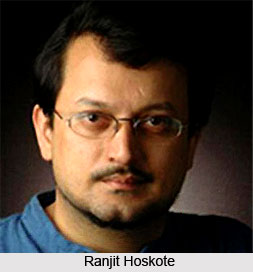 Ranjit Hoskote is a Mumbai based Indian poet. Hoskote is also known as an art theorist and an independent curator. Presently he is the assistant editor of "The Hindu". He was born in the year 1969 in Mumbai. Early education of Hoskote took place in the Bombay Scottish School followed by the Elphinstone College where the poet of the modern day had pursued his higher education. Hoskote had done his BA degree with History as his major subject. In the post graduation level he had pursued degree in English Literature and Aesthetics. Hoskote belongs to the younger generation of poets who had started publishing their works in the 1990s. The work of Hoskote had been published in several Indian and International journals.
Ranjit Hoskote is a Mumbai based Indian poet. Hoskote is also known as an art theorist and an independent curator. Presently he is the assistant editor of "The Hindu". He was born in the year 1969 in Mumbai. Early education of Hoskote took place in the Bombay Scottish School followed by the Elphinstone College where the poet of the modern day had pursued his higher education. Hoskote had done his BA degree with History as his major subject. In the post graduation level he had pursued degree in English Literature and Aesthetics. Hoskote belongs to the younger generation of poets who had started publishing their works in the 1990s. The work of Hoskote had been published in several Indian and International journals.
Ranjit Hoskote incorporates the imagery of landscapes, allusions and sky. Just as a chemist experiments with chemicals in the laboratory, similarly Hoskote also experiments with language. The sense of linguistic play has been abundantly used by Hoskote but this particular literary style is missing in most of sub-continental poetry. It can also be said that all the poems of Hoskote includes the essence of fables.
The general trend of Hoskote`s poems is consistent and exceptional brilliance in the treatment of images. The metaphors which the poet has used in his poems are luminous, sensuous and are finely wrought. As a result the use of such metaphors in the poems makes the poem a multi-faceted experience.
Poems that are written by Hoskote can be called intellectually rigorous. At the same time the poems are also technically watchful, erudite in nature and explore the possibilities of the images that have been used. The style of his writing is assorted.
It is true that Nissim Ezekiel has been the mentor of Hoskote but Hoskote has never used the poetics which were used by Ezekiel. On the other hand his aesthetic choices resemble more the style of Dom Moraes and Adil Jussawalla. The other writers who have had strong influence on Hoskote were Wallace Stevens, Brodsky, Montale, Agha Shahid Ali, Bhartrihari and Jayadeva.
Besides writing poetry, the poet is also associated with several organisations which work for the development of literature. As an art critic, the man has always focused on experiences which are parallel to beauty. At the same time he has also explored the relationship between aesthetics and the politics. Hoskote is also a supporter of cultural freedom and in every situation he has protested against all kinds of cultural intolerance.
Till date Ranjit Hoskote has published three collections of poetry, co-translated the Marathi poems of Vasant Dahake to English and has edited a collection of fourteen contemporary Indian poets. Some of the well known poems of Hoskote are, "Zones of Assault", "The Cartographer`s Apprentice", "The Sleepwalker`s Archive" and "Vanishing Acts: New and Selected Poems 1985-2005".
From his exceptional contribution in the field of literature the country has honoured him with several awards. His awards include Sanskriti Award for Literature in 1996, the British Council / Poetry Society of India Annual Competition in 1997 and finally in the year 2004 Hoskote was awarded with Sahitya Akademi Golden Jubilee Award.
Hence it can be concluded saying that Ranjit Hoskote is a contemporary poet of modern India and the approach is very modern as far as his poems are concerned.













